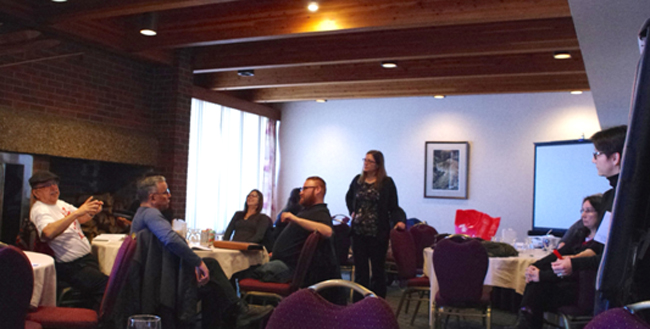Mining engagement included discussion about water

By Rick Garrick
THUNDER BAY – First Nation-owned bottled water and mining companies were among the ideas brought forward at the Anishinabek Nation Mining Engagement: Northern Superior round table discussion.
“Why not capitalize on the water that we protect,” says Terry Bouchard, lands and resources consultation points person at Red Rock First Nation. “We have it all around our territory; we know where the springs are. Instead of the (other) people taking all the cream, I think it is about time that we started taking advantage of the resources that are out there that were given to us by our creator.”
Bouchard says the creation of a bottled water company would be “an adventure”.
“Water is going to be the biggest commodity there is, the most expensive commodity,” Bouchard says. “There are going to be wars over that in the future. So if we take the bull by the horns right now and claim what is naturally ours that was given to us by the creator, I think we can form our company and we can put our monies back into our own economy.”
While some Robinson Superior community leaders brought up the idea of starting up a First Nation-owned mining company during the Mining Engagement round table, which was held on Feb. 4 at the Valhalla Inn in Thunder Bay, other leaders were more cautious.
“It’s a good idea, but in my mind I still think we need the capacity within the First Nations to actually do that,” says Doug Moses, Pays Plat’s economic development officer. “We have to watch how we get involved. If we are going to start up a mining company, are we ready to accept the liability. Because these mining companies, if they have a large spill they have to accept the liability.”
Moses says his community has been monitoring the water on the Pays Plat River, which flows through his community into Lake Superior. The community has also been sending a student to monitor the Winston Lake Mine, which closed in 1998, for the past seven years.
“We created a database for baseline data so that (if there are) any fluctuations in water or land contaminants, we will know when they happened,” Moses says. “Everything that happens up stream from us, we are aware of it.”
Sarah St.Louis, special projects officer with lands and resources at the Union of Ontario Indians, says there are a lot of opportunities for First Nations to develop different companies.
“Where we get snagged up is ‘what is the process,’” St.Louis says. “What is the process to begin these different kinds of projects, where do we get the start-up capital. So that was what was really great about having a mining and economic development discussion over two days.”
The Mining Engagement round table was held in conjunction with the Robinson Superior Economic Development Think Tank, held on Feb. 3.
“It’s great to see that our communities are seizing opportunities, identifying opportunities but also still incorporating that traditional knowledge,” St.Louis says.
St.Louis says the next meeting will focus on: how do we move forward.
“Here’s the process, how are we going to start engaging in that process to get some of these projects going, some of them loftier than others, but I think there is all sorts of opportunity up here that we can tap into.”


